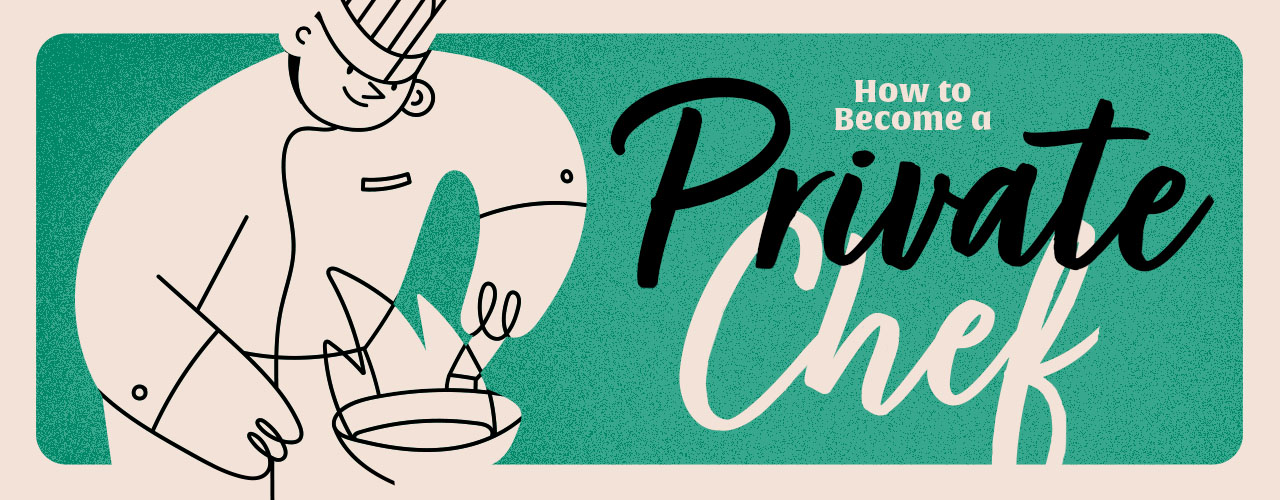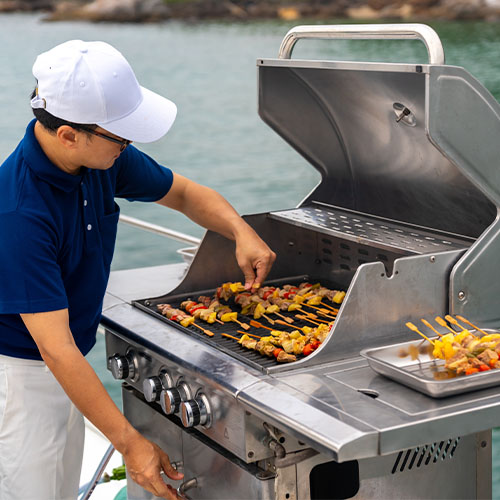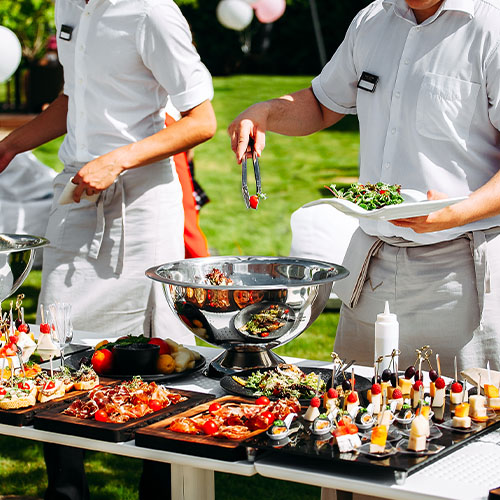
Whether you’re considering a career in the culinary arts or have been working your way through the kitchen brigade, you may be curious about what career paths you can explore as a chef. One exciting avenue to consider is becoming a private chef. Private chefs work directly for individuals or families, providing personalized culinary experiences in a variety of settings. We'll walk you through the different roles within the personal chef field and how you can get started.
Types of Private Chefs

To truly be a private chef, culinary professionals must work one-on-one with a family or individual, providing exclusive culinary services tailored to their specific needs. These chefs are dedicated solely to their clients, which is why they are referred to as "private" chefs. However, there are several routes chefs can take if they want to work one-on-one with their clients. We outline a few different career paths for chefs outside of the restaurant industry below:
- Live-In Private Chef: A live-in private chef resides in the same household as their employer. This arrangement often involves the chef preparing the daily meals for the family and being available for special events or gatherings. This type of private chef may also be responsible for grocery shopping, menu planning, and maintaining the cleanliness of the kitchen area. Unlike restaurant chefs who typically stick to the kitchen and don't have forward-facing roles, many private chefs are called on to interact with clients and guests, so a strong sense of charisma and interpersonal skills is essential.
- Live-Out Private Chef: A live-out private chef does not reside in the employer's home and instead commutes to the location to prepare meals as needed. They may visit the employer's home on specific days or times to cook meals in advance or on the spot. They may have the flexibility to work on a part-time or freelance basis.
- Personal Chef: A personal chef typically works with multiple clients, offering meal preparation services tailored to their dietary preferences and restrictions. Personal chefs often cook in clients' homes, preparing meals in advance for the week or special occasions.
- Yacht Chef: Yacht chefs work on luxury yachts, preparing gourmet meals for the vessel's owners and guests. These chefs must be skilled in creating high-quality cuisine in a limited space and under challenging conditions, such as rough seas.
- Micro-Event Chef: A micro-event chef specializes in providing on-site cooking services for small parties, creating a memorable dining experience. Micro-weddings have become a popular trend for couples looking for intimate ceremonies, creating a larger need for this type of personal chef.
- Cooking Instructor: Some personal chefs also work as cooking instructors, teaching clients how to prepare delicious meals in their kitchens. These chefs may offer individual or group cooking classes, focusing on specific cuisines or techniques.
- Health and Nutrition Chef: Health and nutrition chefs specialize in creating nutritious and balanced meals for clients with specific dietary needs, such as those following a gluten-free, vegan, or low-carb diet. These chefs focus on using fresh, whole ingredients to promote overall wellness through food.
Personal Chef vs. Private Chef
A private chef is dedicated to serving the culinary needs of a single client or household exclusively. This means that the private chef works either on-site at the client's residence or off-site at a location specified by the client. The primary responsibility of a private chef is to create customized menus, prepare meals, and provide exceptional dining experiences tailored to the client's tastes and dietary requirements. Private chefs often work closely with their clients to understand their preferences and deliver high-quality, personalized meals.
On the other hand, a personal chef has the flexibility to work for multiple clients and offer a variety of culinary services. Personal chefs typically provide meal preparation services, catering for micro-events, hosting dinner parties, and creating customized meal plans for clients with specific dietary needs. Unlike private chefs who focus on serving one client exclusively, personal chefs have the opportunity to engage with a diverse range of clients and showcase their culinary skills across different settings and occasions.
How to Become a Private Chef with No Experience
Now that you're familiar with the different types of private chefs, we guide you through the steps you can take to secure a coveted private chef position. In pursuing a career as a personal chef, it is important to note that certain steps may differ based on your specific career goals, but many of them are applicable across different paths within the personal chef industry.
1. Earn Culinary Education and Training

While formal education is not always a strict requirement, obtaining a culinary school degree can significantly boost your skills and credibility in the industry. Attending culinary school provides aspiring private chefs with the opportunity to hone their culinary techniques, learn about different cuisines, and gain valuable hands-on experience in professional kitchens. Additionally, culinary education instills essential skills such as menu planning, food safety, and kitchen management, which are crucial for success in the private chef industry.
One of the key benefits of attending culinary school is the opportunity to network with industry professionals and find mentors who can offer guidance and support as you navigate your career as a private chef. Building relationships with experienced chefs and industry insiders can open doors to new opportunities and help you secure high-profile clients who appreciate the value of hiring a skilled and knowledgeable private chef. Clients who can afford a private chef typically have a discerning palate and high expectations when it comes to the quality of food and service they receive, so honing your culinary skills through formal education and training can ensure that you meet and exceed the expectations of your clients.
2. Educate Yourself on Dietary Needs
As a private chef, your role extends beyond just preparing delicious meals. You will often be tasked with catering to clients with specific dietary needs and restrictions. This includes individuals with conditions such as Crohn's disease, diabetes, and other chronic health conditions. Understanding how to nourish individuals with these conditions while still creating flavorful and satisfying meals is vital.
In addition to medical conditions, being able to identify and avoid common allergens is essential to ensure the safety and well-being of clients with food sensitivities. Moreover, staying informed about different dietary trends is key in the personal chef world. Clients may follow specific diets such as keto, paleo, vegan, or gluten-free, so being able to adjust your menu and cooking techniques to accommodate these dietary preferences is essential in meeting the diverse needs and whims of your client.
3. Acquire Business Acumen
Having a solid grasp of the business side of being a private chef is essential for long-term success in the industry. By incorporating financial savvy, technological investments, and market knowledge into your culinary skills, you can build a thriving private chef business that attracts and retains satisfied clients.
- Incorporation or LLC: Setting up your business as an incorporation or Limited Liability Company (LLC) can help you manage your taxes efficiently. Consult with an accountant to determine the best structure for your business to avoid unexpected tax liabilities at the end of the year.
- Invest in the Right Technology: To run your private chef business successfully, invest in the necessary technological tools. This includes Customer Relationship Management (CRM) systems to manage client relationships effectively and accounting software to track expenses and revenue.
- Market Research: Educate yourself about your target market, ideal clients, and the demographics of your area. Understand what your competition is charging for similar services in your locality. Knowing what clients are willing to pay is essential, but it's also important to price your services competitively. If you are new to the industry, consider starting at an average price point before gradually increasing your rates as you gain experience.
4. Gain Industry Experience
In the culinary world, the art of cooking is not just about following recipes; it is about creativity, innovation, and skill. Aspiring private chefs must possess the ability to create unique recipes and dishes that will impress their clients. To attain a high level of expertise in this field, it is essential to acquire experience within the industry. One of the most effective ways to gain valuable experience as a private chef is to work in a top-tier restaurant. By working in a high-pressure, fast-paced environment, you will hone your culinary skills, learn new techniques, and familiarize yourself with a wide range of ingredients.
Another valuable step in gaining experience as a private chef is to find a mentor to train under. A mentor can provide guidance and offer valuable insights into the industry. Working closely with an experienced chef will allow you to learn from their experiences, receive constructive feedback, and develop your culinary style.
5. Build a Culinary Portfolio
A culinary portfolio is a comprehensive collection of your work, highlighting your skills, experience, and creativity as a chef. It serves as a visual representation of your culinary journey and can be a powerful tool in establishing your credibility and attracting potential clients. When selecting the dishes to include in your portfolio, consider showcasing a variety of flavors, cooking techniques, and presentation styles.
An essential element of a strong portfolio involves showcasing a collection of signature dishes that you have perfected for tasting menus. These dishes do not have to be fancy or designed for large-scale catering events; they should simply reflect what you love to cook and what sets you apart as a chef.
6. Network and Gain Clientele

Networking is a crucial aspect of becoming a successful private chef. By expanding your professional connections and engaging with various groups, you can open doors to new opportunities and potential clients. Here are some effective networking strategies to help you thrive in the private chef industry:
- Obtain the STCW Certification: This certification allows you to be a chef on boats, which can lead to lucrative opportunities on yachts. Working on yachts allows you to interact with high-profile individuals who may require the services of a private chef.
- Join Mom Groups: Parenting communities frequently look to engage the services of professional chefs to cater to the culinary needs of their households. Many mom groups have specialized local business subgroups on platforms like Facebook and Nextdoor. By actively participating in these groups and offering valuable advice without expecting anything in return, you can establish yourself as an expert and build credibility within the community.
- Seek out Private Chef Groups: Not only can you gain valuable advice, but professionals in these groups also often share clients within the same geographic area. By collaborating with other private chefs and engaging in client trading, you can expand your client base and establish mutually beneficial relationships within the industry.
- Attend Foodie Events: Foodie events, such as food festivals, cooking competitions, and culinary workshops provide an excellent platform to connect with potential clients and other industry professionals. By participating in these events, you can showcase your skills, engage with a diverse audience, and promote your services to a wider clientele.
- Cooking Classes: Hosting cooking classes can be a great way to present your skills to a wider audience. You can offer classes in a variety of formats, such as in-person workshops, virtual sessions, or even private lessons in clients' homes.
- Meal Prep Service: By offering customized meal plans and preparing delicious and healthy meals in advance, you can demonstrate your culinary talents and build relationships with clients who may later hire you for private chef services. This also allows you to connect with local businesses, gyms, or wellness centers that may be interested in partnering with you to offer meal prep solutions to their customers.
7. Consider Starting as a Personal Chef or Caterer
Even if it's your ultimate goal to secure a private client, starting as a caterer or personal chef can help you reach that goal. Catering companies that serve high-profile events often work with affluent clients who may require the services of a private chef. Additionally, working at a catering company allows you to network with other industry professionals, such as event planners, venue managers, and food suppliers.
These connections can lead to referrals and recommendations for private chef opportunities, as well as provide valuable insights and advice on how to succeed in the private chef industry. Even working as a server at a catering company can help you network with these high-profile clients and gain insight into their culinary preferences and expectations. This experience can be invaluable as you work towards becoming a private chef for discerning clients.
8. Use Online Platforms for Exposure

In today's digital age, having a strong presence on social media platforms is essential for promoting your private chef services and reaching a larger audience. Create professional profiles on popular platforms like Instagram, Facebook, and TikTok to display your culinary creations, share cooking tips, and engage with followers. By actively engaging with the online community, sharing valuable content, and developing a YouTube channel, private chefs can establish themselves as thought leaders and build credibility in their field.
Websites such as Take a Chef and Hire a Chef provide a convenient way for clients to search for private chefs or for event planners to find the perfect chef for an elaborate dinner party. By creating a profile on these online platforms, private chefs can spotlight their culinary skills, specialties, and past experiences to a wide audience. These platforms offer a user-friendly interface that allows clients to browse through profiles, portfolios, and reviews of private chefs. Clients can specify their preferences, dietary restrictions, and budgets, making it easier for chefs to tailor their services to meet the client's needs. For event planners, these platforms streamline the process of finding a skilled chef who can create a memorable dining experience for their guests.
Becoming a private chef can be a rewarding and fulfilling career choice for culinary professionals looking to apply their skills in a more personalized setting. By following the steps outlined in this article and staying committed to your passion for cooking, you can embark on a successful career as a private chef and create memorable dining experiences for your clients. For help with getting started in a culinary career, check out WebstaurantStore’s scholarships.





